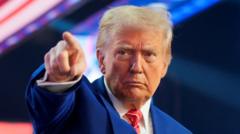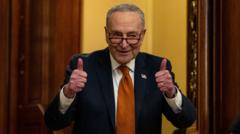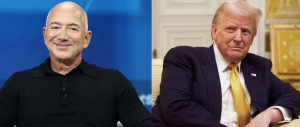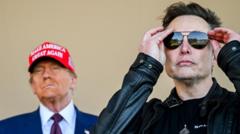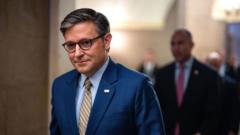Matt Gaetz's brief stint as President-elect Donald Trump's nominee for attorney general has come to a shocking halt after only eight days. His nomination sparked outrage among legal circles and fueled ongoing ethical concerns over his actions, leading to his withdrawal amid increasing scrutiny.
Matt Gaetz's Brief Rise to Attorney General Nomination: A Political Turmoil
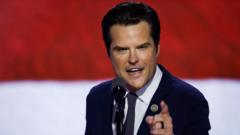
Matt Gaetz's Brief Rise to Attorney General Nomination: A Political Turmoil
In an astonishing eight-day saga, Matt Gaetz's nomination by President-elect Trump as attorney general ends in an unexpected withdrawal amidst controversies and ethical questions.
In a whirlwind eight days laden with political drama, Representative Matt Gaetz found himself at the center of a heated controversy after being nominated by President-elect Donald Trump for the position of attorney general. The appointment, made during a flight from Washington to Florida, stunned many in Washington, especially since Gaetz was not even on the shortlist for the post prior to Trump's decision.
Reports indicated that the idea to nominate Gaetz emerged on the plane, where Trump and his advisors, including Elon Musk and Chief of Staff Susie Wiles, convened. The president-elect's choice raised eyebrows, especially after Gaetz had previously faced scrutiny over a sex-trafficking investigation, which the Justice Department had dropped. As a vocal supporter of Trump, Gaetz had positioned himself as a loyal ally, notably aiding in Trump's debate preparations against President Biden.
Despite Gaetz's unorthodox nomination, reactions from various quarters were mixed. While some Republicans showed a degree of support, many career lawyers at the Justice Department reacted with disbelief, recalling Gaetz's past calls for dismantling the very agency he was expected to lead. Critics decried Trump's apparent prioritization of loyalty over legal integrity. Former Trump National Security Adviser John Bolton characterized the nomination as possibly the "worst cabinet-level appointment in history." Conversely, Donald Trump Jr. defended the unconventional choice, claiming it reflected the change voters desired.
As the nomination proceeded, Gaetz resigned from his congressional seat amid impending ethics investigations concerning allegations of misconduct. The House Ethics Committee faced pressure on whether to release its findings, which reportedly involved claims of serious misconduct, including drug use and relationships with underage individuals. Gaetz dismissed the accusations as politically motivated.
The nomination quickly became contentious. As backlash grew, Trump worked to muster senatorial support, even as lawmakers cautioned that confirmation hearings could be fraught with challenges. Ultimately, by midday of his final day as a nominee, Gaetz himself acknowledged the lack of necessary votes and chose to withdraw, framing his decision as one motivated by a desire to not distract from critical transition efforts.
In a notably subdued public acknowledgment, Trump expressed his gratitude for Gaetz’s efforts while swiftly nominating former Florida Attorney General Pam Bondi to fill the role instead. Though Gaetz's political future seemed uncertain, many speculated that he would remain influential in Trump's orbit. Supporters expressed belief that Gaetz's story in politics wasn't over and looked forward to his next potential endeavors. Meanwhile, his wife reflected on their journey, marking the end of an era on social media.
With a special election poised to fill Gaetz's Congressional seat, this latest political chapter leaves lingering questions about accountability and loyalty in the turbulent landscape of the Trump administration.


